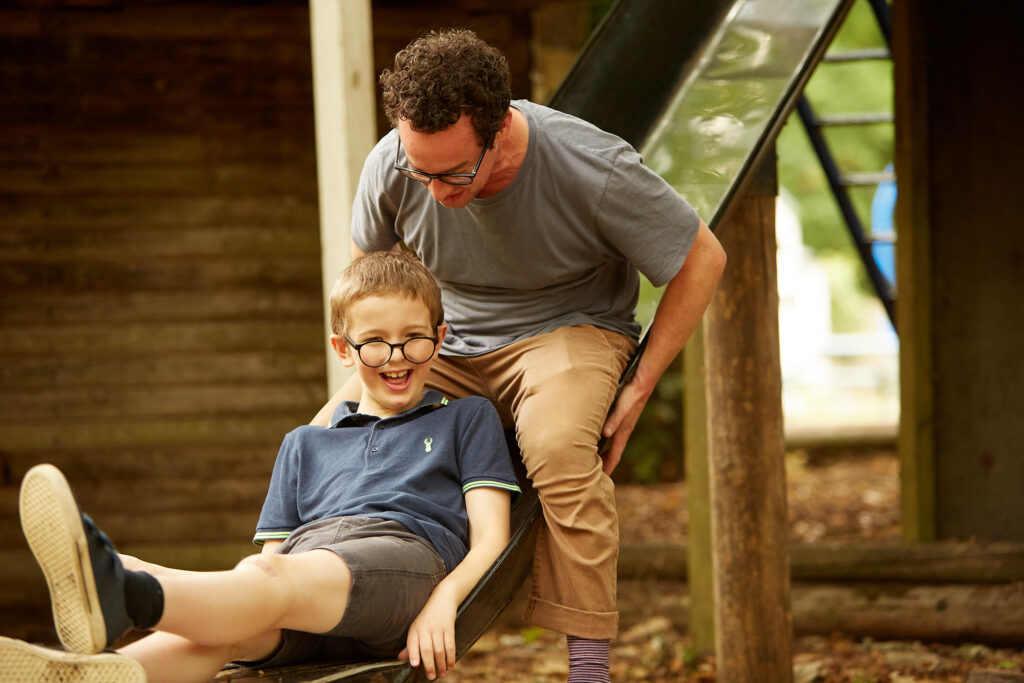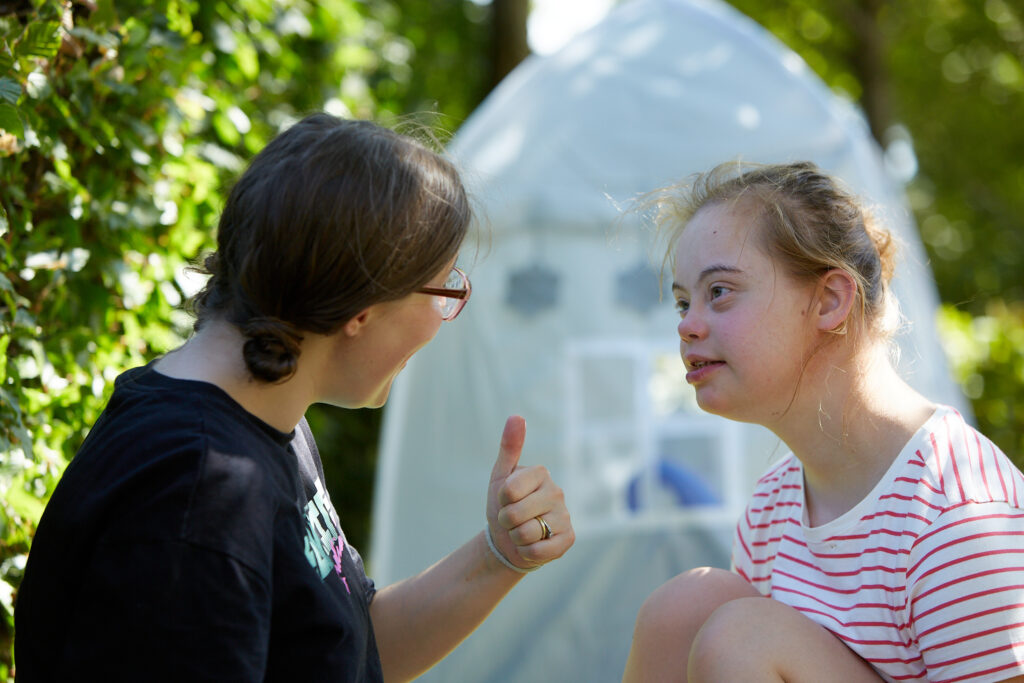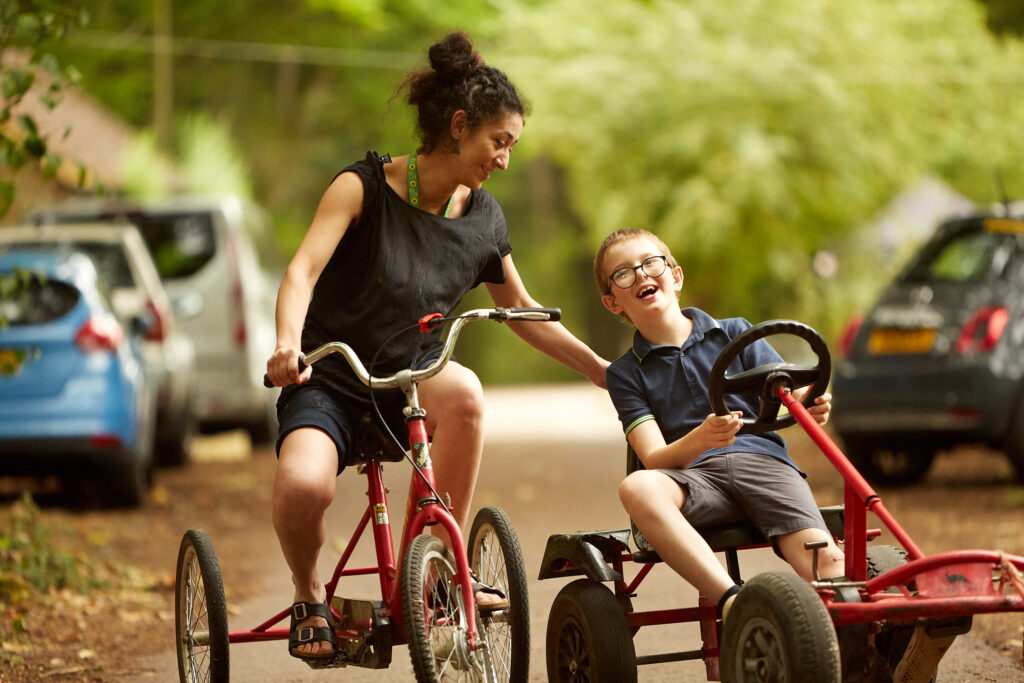How we make sure that every Sense Holiday is as unique as our holidaymakers
Jess has been involved with Sense Holidays since 2014, when she started as a volunteer. She loved it so much she kept coming back year after year, eventually becoming a holiday leader (the person in charge of all the volunteers on the holiday).
She’s now a holiday coordinator, which means she works hard all year round to plan each season of fantastic Sense Holidays. In this blog, she explains all about the care that goes into making every holiday unique.

On a Sense Holiday, everything is chosen by our holidaymakers – down to the snacks!
Every day on a Sense Holiday is different, and we’ll plan it around what the holidaymaker wants to do.
Some people like to fill the morning with exhilarating activities, then chill out. So we might start the day with something like rock climbing or adapted cycling, then they might pick a movie, or sensory play.
Sense holidays have been going for about 50 years, and there’s a lot of knowledge that comes with that.
That’s one of the reasons why Sense holidays are so sought after – we’ve got this deep understanding of what people need and want out of a holiday. A lot of work goes into delivering that.
We get to know everything we can about our holidaymakers
We start tailoring each holiday by working closely with our holidaymakers and their families. We have lots of calls, to get to know all about their interests and experiences.
We also want to know what they want to get out of the holiday. Do they want to try new activities? Make friends? Relax?
We also speak to other people that work with the holidaymaker, like speech and language therapists or teachers. This gives us the whole picture.
A lot of people return to Sense Holidays year after year. So we know them really well.
Once we’ve got to know all our holidaymakers for the year, we use the knowledge we have about them to match them with volunteers and holidaymakers they’re likely to get along with.
We often match people who have similar communication needs. For example, we might organise a holiday where everyone uses sign language.
“My favourite part of my job will always be seeing the holidaymakers’ expressions when they arrive at the venue, knowing they’re going on a Sense Holiday.”
A lot of thought goes into matching the holidaymakers together. We make sure there’s some balance on every holiday. Some people really love adrenaline sports, but others might want a leisurely walk in the woods or to try something cultural like a jazz music workshop. We make sure the pace of the holiday suits the holidaymaker’s wants and needs.
We also use the information we have about our holidaymakers to shape the training that we give to volunteers and staff.
And of course, we choose accommodation and activities that will be accessible to those holidaymakers.

We give our holidaymakers choices to create the holidays of their dreams
We make sure that there’s flexibility on every holiday, so holidaymakers can suggest ideas or change their minds about what they’d like to do. They’re in charge!
On one holiday I was volunteering on, the young people were sharing scrapbooks and talking about activities they’d like to do together, and came up with the idea of a midnight feast.
The holiday leader said, if that’s what you want to do, we’ll do it!
So we woke them up at midnight for some hot chocolate and marshmallows.
They were only up for a little while, but it was lovely – they felt they’d had a sort of sleepover experience. It’s nice for them to have similar experiences to what other teenagers are getting in mainstream settings.
Last year, we even took a group of young adults to a festival.
Often festivals can’t accommodate people with complex disabilities. They can be difficult for wheelchair access, and don’t always have a clear timetable of events, which can cause stress for autistic people.
We made connections with the festival beforehand, and made adjustments so that the young people could attend. It was amazing.
Things like this broaden their experiences of life.

Sense Holidays build confidence, friendships and memories
My favourite part of my job will always be seeing the holidaymakers’ expressions when they arrive at the venue, knowing they’re going on a Sense Holiday.
They quickly start to build friendships. Throughout the week, that bond cements. They’ll have their own inside jokes and handshakes!
So many disabled people are chronically lonely. Sense Holidays are just a great way of connecting. Some people still come on our holidays into their 90s, developing those friendships for years and years.
People also really develop their confidence, especially by doing exhilarating activities like abseiling or rock climbing.
“Parents have told me that they feel really seen by Sense. It can be really tough for them to explain to other people how to support their child.”
It’s a challenge for anyone to get on a zip wire, but if you’ve got a visual impairment, for example, it really is the unknown. So holidaymakers learn to believe in themselves.
It’s somewhere where they can really live life to the full.
They also get to spend time with enthusiastic role models, and build their social skills.
Sense Holidays are so specialist – if they didn’t exist, there would be a big hole left behind. It’s so significant for some of our holidaymakers, they look forward to it all year round.
Sense tailors care to every person with complex disabilities
For families, sending a loved one on a Sense Holiday is exciting, because Sense has an understanding of complex disabilities.
A lot of other charities or services have a niche in one area, but Sense has an understanding of how different disabilities and needs connect.
Parents have told me that they feel really seen by Sense. It can be really tough for them to explain to other people how to support their child. So while schools or homes can offer some respite care, some parents say they feel a bit guilty.
But when they send their children on a Sense Holiday, they can feel absolute trust that the holidaymakers are going to have a wonderful tim and create lifelong memories.
They’re having the ultimate personalised holiday that’s based on all of their interests, and they’re with friends they’ve been matched with based on their personality.
The parents can relax, and maybe even go on holiday themselves!
Sense Holidays are more than just holidays
Sense Holidays give disabled people the chance to have adventures and broaden their horizons. And they give carers a much-deserved break.
Your support helps us provide this opportunity for people with complex disabilities and their families.

